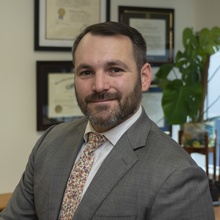By Charlotte Brookins
Rishab Nithyanand, an assistant professor in the Department of Computer Science in the College of Liberal Arts and Sciences, seeks to incorporate legal education into undergraduate computer science studies as part of a research project in collaboration with the College of Law alongside professor Mihailis Diamantis.
Nithyanand and Diamantis received a nearly $300,000 grant from the National Science Foundation(NSF) for their collaborative project, entitled “EAGER: Education DCL: Taking Law into Our Own Hands: Infusing Law into CS Education, Early and Often.”

In addition to fostering the already-existing Privacy Law and Technology class, the grant will be used to further the integration between the two programs, especially by bringing legal education to undergraduate computer science students.
Diamantis describes the unique nature of the existing course’s curriculum, saying, “It balances both the legal and technical aspects of privacy, and it’s open to both law and computer science students.”
Nithyanand explains how a critical gap has formed in computer science education over the years as a result of the belief that legal aspects of computer science should be left to the lawyers. However, this grant is meant to counteract this.
“We are broadly focused on improving the state of computer science education by providing students with early and continuous exposure to the regulations and processes that govern their work,” Nithyanand elaborates. “Simply put, we are interested in developing new and modifying existing computer science curriculum to create a more law-aware computer science workforce.”
Both faculty members say that this project was inspired by the university’s proficiency in law and computer science alike, as well as its successful history in interdisciplinary work. The proposal was initially formed from a conversation held between Nithyanand, Diamantis, and former computer science professor Supreeth Shastri, who now is employed at King’s College in London.
In the wake of the NSF grant, Privacy Law and Technology will remain the same; however, since the majority of its students are at the graduate level, Nithyanand and Diamantis hope to expand their combined curriculum to reach more people in the undergraduate program.

“We’ll be developing resources that computer science professors can integrate into their core undergrad courses,” says Diamantis. “We also hope to develop an undergraduate, extracurricular computer science lab that educates students about data privacy requirements, trains them to detect violations, and prepares them to collaborate with law students.”
Nithyanand and Diamantis intend for this program to be the first of many, especially in a world where technology and the legal system are so deeply intertwined. By providing students with lectures and hands-on training before measuring their performance and receiving feedback, the two professors hope to continually improve the program.
Both faculty members wish to express their gratitude for the support they have received from the university and their respective colleges throughout this process.
“This project is a testament to the collaborative environment we have here,” says Nithyanand. “Working across disciplines, particularly with Mihailis Diamantis, has opened up new perspectives and methodologies in my research. This wouldn't have been possible without the rich interdisciplinary culture here at Iowa.”